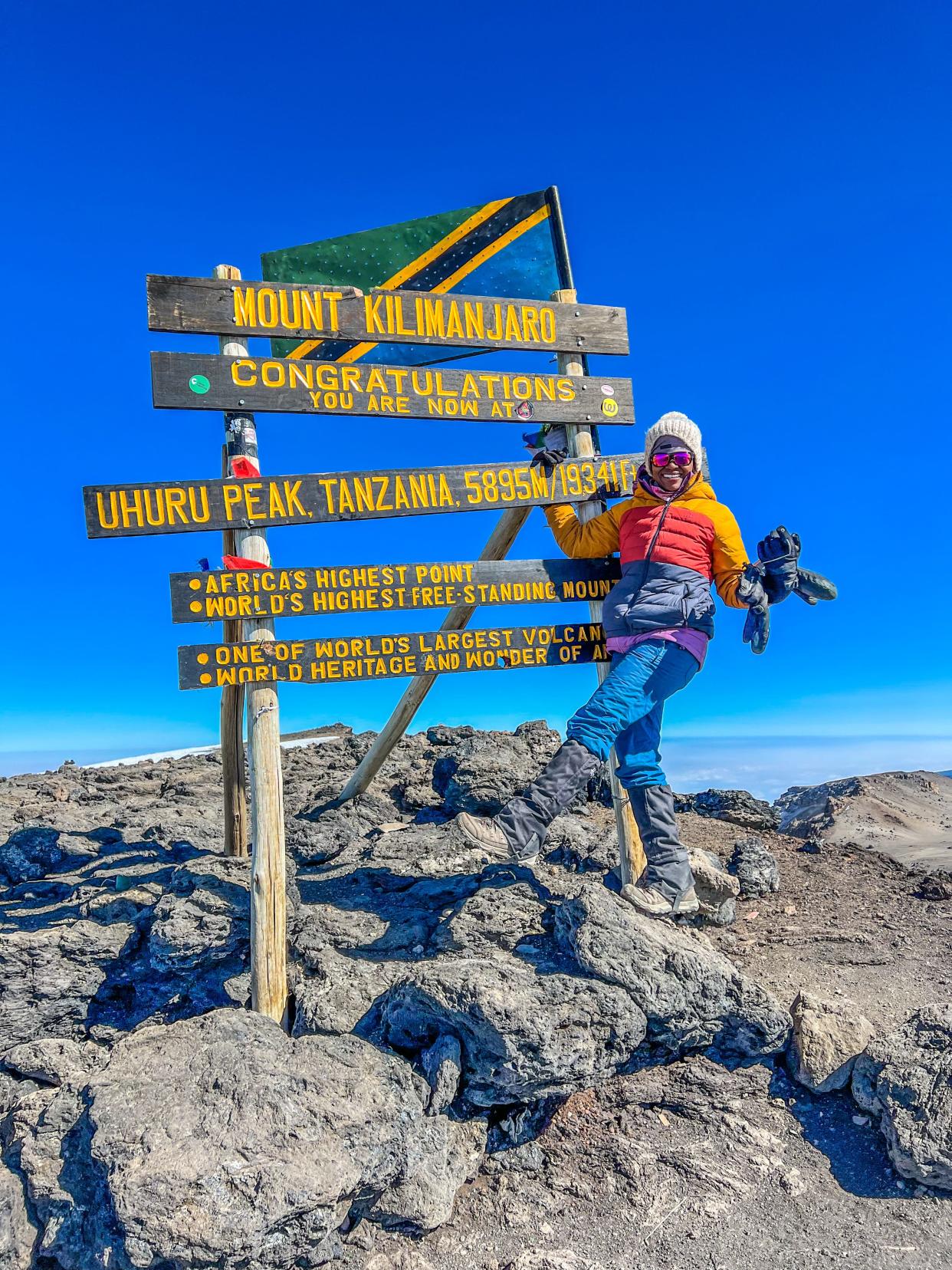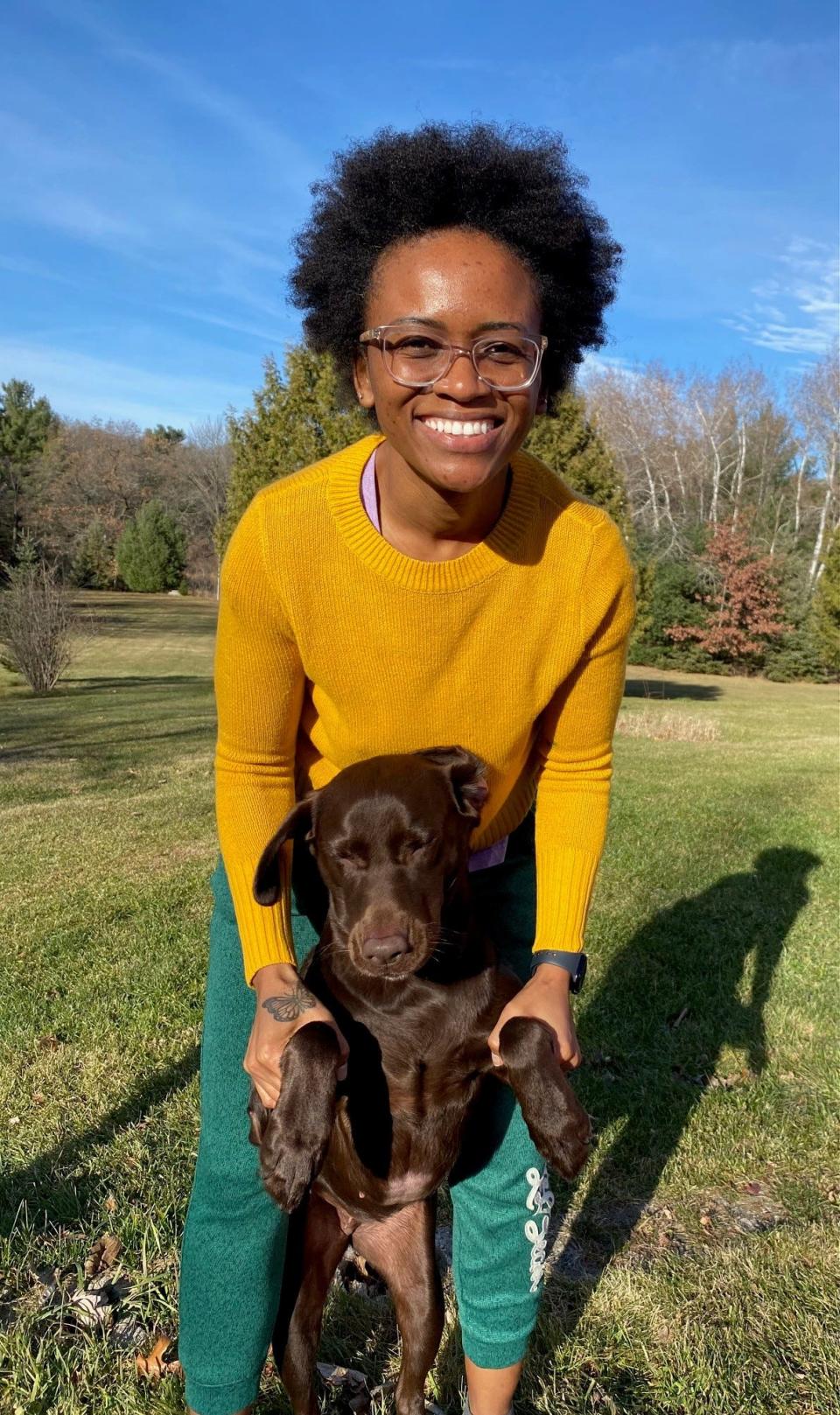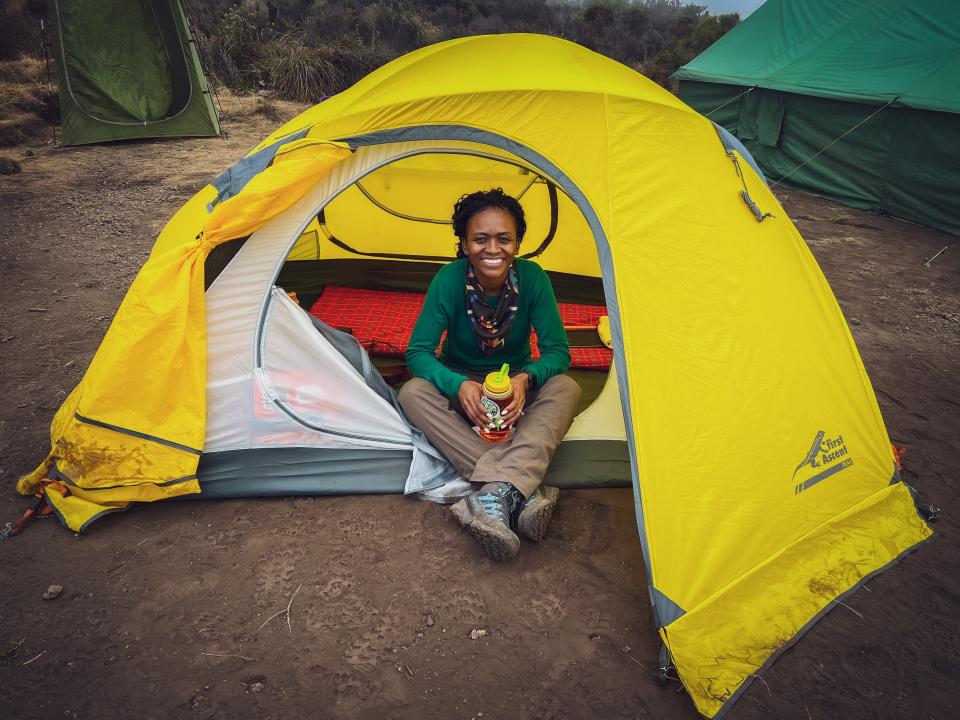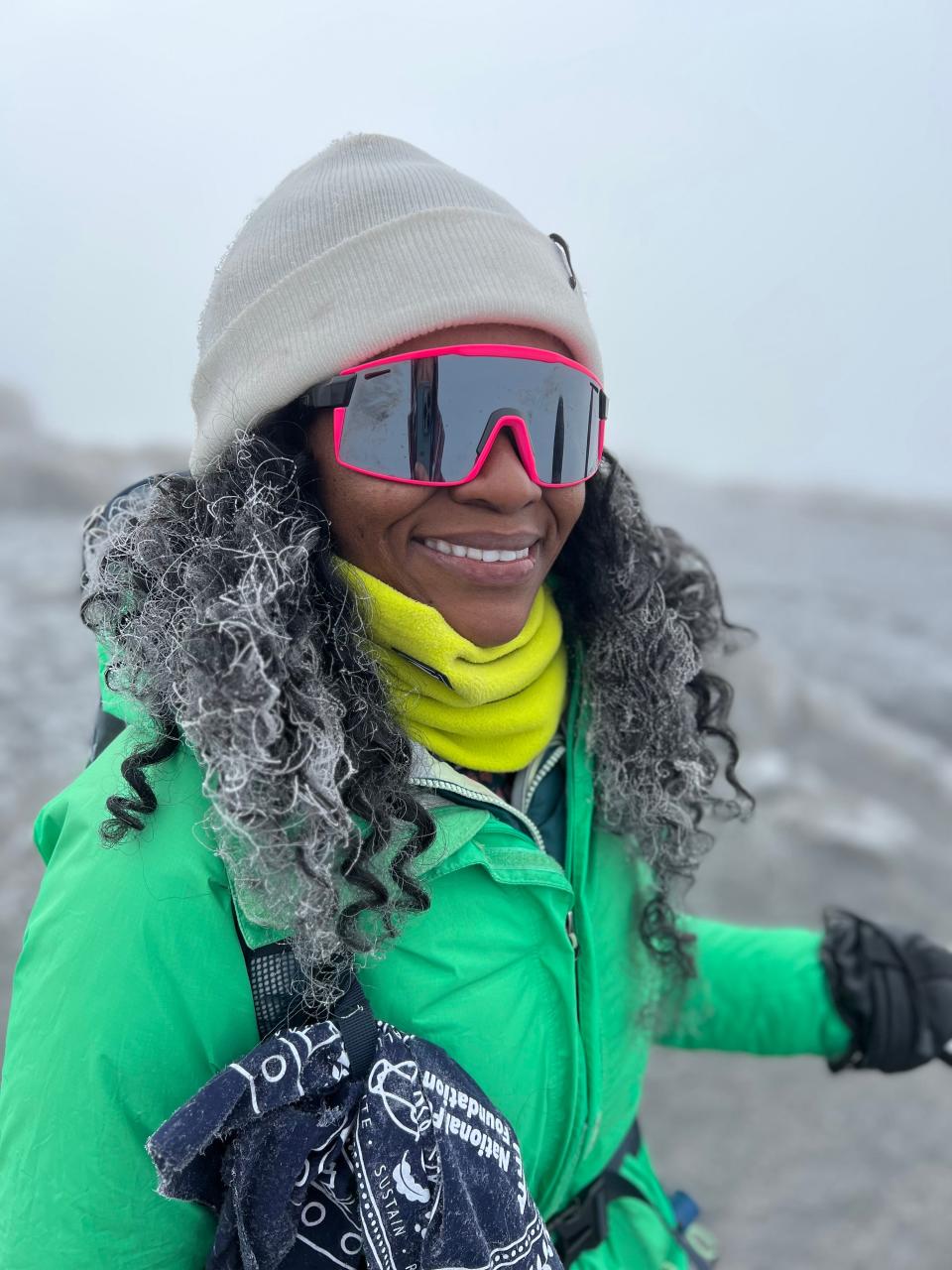How does a woman from South Africa find her bliss in Wisconsin? Dineo Dowd goes outside

The trek to the summit of Kilimanjaro took days.
Not one step came easily for Dineo Dowd, a Wisconsin-based author, blogger and outdoors enthusiast who has become a leading voice for encouraging people — especially women, mothers and people of color — to find fun and accomplishment in the outdoors.
Kilimanjaro is Africa's tallest mountain, rising 19,340 feet into the thin air above the Tanzanian landscape. Dowd lives in Sun Prairie, which in no way prepares a person for high-altitude exploits, and during her trek she dealt with frigid temperatures, altitude sickness, physical exhaustion and crippling anxiety.
"I was scared, I was so scared," Dowd said. "It was like a bad movie."
This was August of 2022, and Dowd was not only fulfilling a personal dream, but she also had brought along 20 other women to accompany her on the adventure. So even though the idea of quitting and heading down the mountain to warm temperatures and oxygen-rich air was alluring, she couldn't. Dowd trudged on, thinking, "If I don't get to do this, it's going to be so embarrassing."
Summiting Kilimanjaro is not a technical climb, so mountaineering equipment such as ice axes, ropes and crampons aren't needed. Instead, Dowd relied on emotional and mental tools to help her to the top: stubborn resilience, comfort from the relationships she built, and the confidence that all the effort and pain and fear would be worth it.
When Dowd finally trudged to the sign denoting the mountain's summit and touched it, she described the rush of emotion she felt as so strong, it almost felt like an out-of-body experience.
"I just cried I was so happy," she said. And then, as the emotions washed through her and she was able to think more clearly about what she just did, another thought came to her: "I want to do this again."
Dowd's triumph came after years of learning, training and planning. But it still defied all odds for a Black girl who was born into the racist, repressive regime of apartheid in South Africa. In a way, the epic hike was a metaphor for the way she has lived her unlikely life. Those same emotional tools that gave her strength to complete the summit also helped her become the outdoorsy, adventurous, curious person she always wanted to be, even though at times it seemed like the whole world was stacked against her.

How a girl from South Africa found herself on trails in Utah
Dowd, who is 38 years old, was born into the apartheid system of South Africa. She grew up in the interior province of Free State which is home to the Drakensberg mountain range and stunning landscapes that attract tourists from all over. But it wasn't so free for Dowd when she was a child.
"That was my back yard," Dowd said. "But growing up, I didn't do that. Because in South Africa, Black people were not allowed to be in those spaces during my time there. ... So we were segregated. Black people, my family, we don't hike, we don't camp, we don't do all those things."
The governing framework of apartheid required racial segregation and legally sanctioned political and economic discrimination against nonwhites. The legal structure was repealed in the early 1990s. But it cast a long shadow, and even after apartheid laws were dismantled, its culture stymied Dowd from becoming the person she wanted to be — someone who hiked, wandered and explored the environment around her.
"I was always curious about it. Why are all these white people here, the tourists with their backpacks and everything?" Dowd said. "What are they doing? What is this all about?"
For years, whenever she asked about hiking trails, camping or anything along those lines, she was told that it wasn't safe or was for white people. Her parents were both teachers, so it was natural for them to stress their daughter's education rather than nurture her yearning to walk out into the mountains.
They sent her to a highly-regarded high school which was one of the former "white" schools, she said. But she and other Black classmates were still required to sit at the back of the class, experiencing the racial discrimination that marked South Africa for so long.
After high school, she conformed to her mother's wishes and studied bookkeeping before working in a bank for several years. She was good at the work and successful. But the job was stifling, and Dowd finally broke free by applying to work as a nanny in the U.S.
She ended up in Salt Lake City and for the first time, took some steps into nature, like she always wanted to.
Dowd could see people driving to a trailhead everyday. Within the first month of moving to the city, she followed those cars.
"And I found myself hiking. By myself. In the back of my mind, I'd rather not be getting lost or anything. I didn't know how to read trail (maps) or miles. I didn't know how to do anything," Dowd said. "I'm like, 'I'm going to go until I get tired, and then I'm going back the same way.'"
Before she knew it, she found hiking groups on social media. She taught herself to read a map. She had found her way.
"In South Africa, I couldn't do it. We were not allowed to (explore the outdoors) in my family. I was not encouraged to go outside and not to do those things because we were told we (Black people) don't do that," Dowd said. "I finally got my freedom when I got to Utah, and didn't care who would see what I'm doing. It was kind of like a calling, and I was going to go for it. Nobody was there to tell me what to do. It was my journey."

Finding community and purpose in Wisconsin
Dowd met her husband, Bryce Dowd, in Utah, and their daughter, Armani, 8, was born there. Bryce grew up in Wisconsin, and his parents embraced their daughter-in-law and granddaughter. And Dowd felt at home when she was with Bryce's family.
Bryce's parents often visited the family in Utah, and at times the young family came to Wisconsin. Dowd loved her new family. But spending time in Wisconsin during winter's cold for the holidays? Not so much.
"I told Bryce I was never going to move here," Dowd said.
But as Bryce's parents fell into ill health, and he yearned to spend more time with them, she said yes. And despite her misgivings, she started to explore the state.
By this time Dowd had become part of an online community devoted to spending time outdoors with children, a group called Hike It Baby. She knew that there were groups based in Wisconsin, so she knew she'd be able to connect and find friends in Wisconsin.
They settled in Sun Prairie, and Dowd immediately scoped out places to explore as a family. She couldn't find any easy resources, so she decided to create one herself. She developed her website, Wisconsin Adventure Family, and started writing about the hiking, camping and other activities the family discovered.
As she worked to help Armani learn more about exploring the outdoors, Dowd looked for books that had children of color as characters. Again, she couldn't find them. So she started writing them herself. She's written 10 books in all, self-published because she wants total control over them.
Despite her initial misgivings about moving to Wisconsin, Dowd's transition to the state was going smoothly. Then the COVID-19 pandemic upended the world. Businesses and public gathering places shut down. Even Wisconsin's state parks shut their gates.

Climbing Africa's highest mountain in response to COVID shutdown
The lockdown felt as stifling as working in the bank.
"I felt like I was hitting a depression," Dowd said, noting the state park closure hit hard. "This is where I go every single day, and now you guys are telling me I can't go?"
She responded by training for a 50-kilometer (31-mile) ultramarathon, which was to be held in Utah. She found some solace in the training, but eventually downgraded to at 30-kilometer race (about 18.5 miles).
"It still was amazing," Dowd said.
After coming back from the race, she remembers thinking to herself that she needed to keep a positive attitude, because "you can overcome so many things," Dowd said. At the same time, she asked herself, what if the world shut down again? What did she want to do?
Dowd's answer was "maybe I need to look outside the country. Maybe I need to do something crazy out there," she said. "I was like, 'I want to go climb Kilimanjaro.'"
Concurrently, she had struck up an online friendship with Saray Khumalo, the first Black African women to summit Mount Everest.
Khumalo encouraged Dowd to make the commitment to climb the African peak, and she offered to help by making arrangements for a guide company to support the journey. By this time, Dowd had been building her own online community, so she asked followers and supporters if they were interested in joining her on the trek.
"I thought, 'I have to bring other women who are going through the same thing, who are craving adventure,'" Dowd said.
Hannah Harris, 52, of Wauwatosa was one of those women. She had been following Dowd on a Facebook group about hiking. And when Dowd posted that there were only three more slots left on the trip, Harris decided she needed to go. She had traveled internationally in the past, but never to Africa. She had done backpacking in the past, and she craved more.
"Something about it appealed to me," Harris said, noting she liked the fact that it was a women-only trip.
Summiting for Harris was about as difficult as it was for Dowd. But Harris said Dowd was always positive, always supportive. Getting to the top "proved I was capable," Harris said. And the experience has her yearning to do more hiking, more traveling to Africa.
Dowd's influence has opened up Harris' perspective about what being outside can be about. Dowd, she said, is an "ambassador" for leading an outdoor lifestyle.
Returning to Kilimanjaro and climbing for a purpose
Dowd returned to Kilimanjaro this year, and this summit was much easier. She learned lessons from the first grueling trek, tampered her expectations.
She also has taken courses to become a certified travel agent, and she plans to continue leading treks to Kilimanjaro and other destinations, including Machu Picchu in Peru.
She said the reasons she's doing the trips have evolved from a personal quest to one that's more altruistic. She's using her climbs up the African peak to raise money to create virtual libraries for school children in Africa — a project that Khumalo already was working on.
Khumalo is the founder of of a group called Summits With a Purpose, which uses expeditions to raise awareness and money for the libraries.
"When we first connected, she was already a hiker, and now she is spreading her wings beyond the USA and I love working with her," Khumalo said in an email interview, referring to Dowd.
Khumalo said that Dowd has had an positive influence on her own approach to the outdoors.
"Before I met her, I focused on my own adventures internationally," she wrote. "But now I have expanded and lead a lot of international adventures to Kilimanjaro and Nepal."
Dowd talks excitedly about the future, especially concerning her ongoing collaboration with Khumalo and Summits With a Purpose. But at the same time, she said she's loving living in Wisconsin and being in tune with all the state has to offer.
She wants to make sure that she appreciates the little things that each day can bring, she said — hiking with Armani, kayaking a stream, having morning coffee with Bryce.
"I feel like I'm growing into nature," Dowd said. "Just being free and being able to connect with nature. It started with the fear, and I didn't belong there and I was told so."
She's forever grateful that she took that first step, she said.
"I can't believe that I was told I can't do this. I'm like, everybody can do this," Dowd said. "Even now when I'm stressed out about something, I just take the dog and go outside in the neighborhood. ... Just getting your brain out there has so many benefits. I can go on and on."
Keith Uhlig is a regional features reporter for USA TODAY NETWORK-Wisconsin based in Wausau. Contact him at 715-845-0651 or kuhlig@gannett.com. Follow him at @UhligK on X, formerly Twitter, and Instagram or on Facebook.
This article originally appeared on Green Bay Press-Gazette: Kilimanjaro climber Dineo Dowd finds joy, purpose in Wisconsin outdoors

